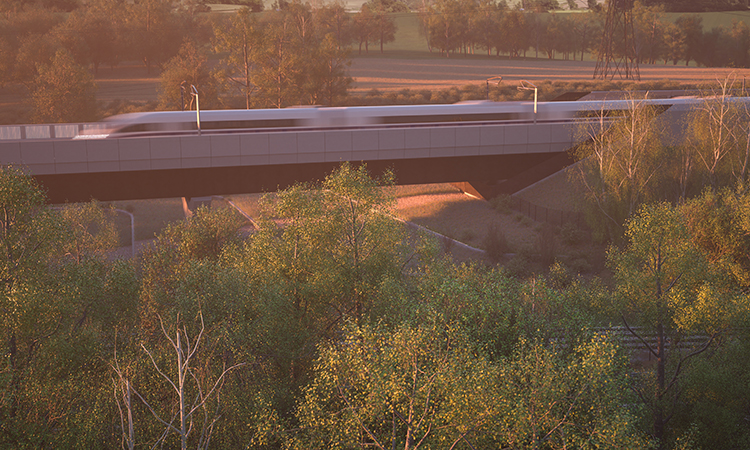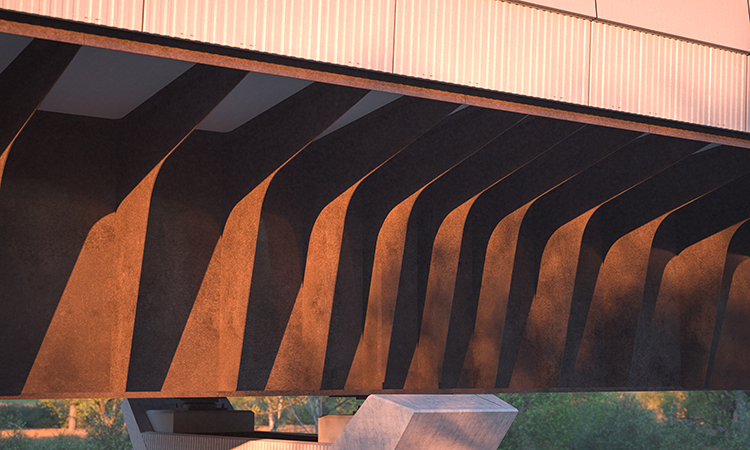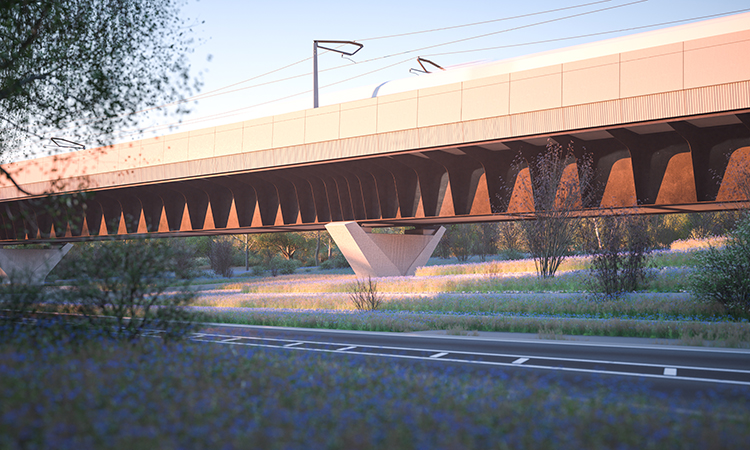HS2’s Small Dean Viaduct given green light
Posted: 20 April 2023 | Elliot Robinson (Editorial Assistant - Global Railway Review) | No comments yet
A key 345m long HS2 viaduct which will take trains across the A413 and local rail lines south of Wendover has been given approval by Buckinghamshire Council.


Credit: HS2
A key viaduct that will take HS2 trains across the A413 and local rail lines south of Wendover has been given the green light by Buckinghamshire Council. The striking 345m long viaduct is the latest major structure to gain design approval, as construction continues to ramp up on the UK’s new high-speed railway.
Set low into the landscape, the viaduct’s enormous girders will be made from weathering steel, which naturally ages to a characteristically dark russet finish to echo the natural tones of the surrounding landscape.


Computer generated image of the Small Dean Viaduct 10 years post construction – Credit: HS2
Designed to be seen from close-up, the viaduct is one of only two places in the Chilterns where the HS2 route will be above ground level, with the underside of the viaduct just 6m above the road, supported by five ‘Y’ shaped piers.
Echoing the great railway bridges of the Victorian age, the side of the girders will feature prominent deck stiffeners which help to manage the structural forces while allowing for a lighter weight beam.
The pale concrete parapet and noise barrier along the top of the viaduct is designed to throw the dark steel into shadow, helping to give the appearance of a lighter and thinner structure. The piers are designed to be as slender as possible, appearing to reach up and grip the beam above.
Structurally, the viaduct girders will use an innovative ‘double composite’ approach, like the nearby Wendover Dean Viaduct. This involves two steel girders sandwiched between two layers of reinforced concrete to create a super strong but light weight span – which will dramatically cut the amount of embedded carbon in the structure.
Both viaducts were designed by HS2 Ltd’s main works contractor, EKFB – a team made up of Eiffage, Kier, Ferrovial Construction and BAM Nuttall – working with their design partner, ASC (a joint venture between Arcadis Setec and COWI) and specialist architects Moxon.
“By providing a cleaner, greener way to travel, HS2 will help cut the number of cars and lorries on our roads, cut demand for domestic flights, and help the fight against climate change,” Kay Hughes, HS2 Ltd’s Design Director, said. “But it’s also vital that we cut carbon during construction, and the innovative approach to Wendover’s Small Dean Viaduct is a great example of how HS2 can deliver elegant viaducts at a fraction of the normal carbon footprint and save construction time.”
Once complete, the viaduct will carry high speed trains between London and the North, helping to improve connections, free up space for more freight and local trains on the existing railway and provide zero carbon journeys for people across the UK.
“Small Dean Viaduct is the most high profile of the 15 viaducts that we are delivering across our 80km central section of HS2, and we have been developing our design to respond to the unique challenges of building a sustainable structure that responds to the local environment,” Simon Matthews, EKFB’s Interface and Stakeholder Director, said. “Using the guidance in the Chilterns AONB Detailed Design Principles, and working collaboratively with local stakeholders, we are very pleased to receive planning approval for this iconic structure and the surrounding features. Works are already underway to prepare for the new viaduct, and over the next two years the foundations and piers will be built alongside the busy A413, before the 5,800 tonne deck will be launched in 2025.”


Computer generated image of the Small Dean Viaduct 10 years post construction – Credit: HS2
“We’re delighted with the news that Small Dean Viaduct has achieved planning consent, a decision that comes after a productive, design-driven dialogue between the team and Buckinghamshire Council officers on the final proposals,” Ben Addy, Moxon’s Managing Director, said. “The character of the site, combined with the pronounced diagonal alignment and low deck level, will result in an especially dynamic appearance when viewed from the carriageway, and evoke a sense of infrastructural grace as the deck passes overhead through the tree canopy.”
As well as the main road, the viaduct will also span the neighbouring Chiltern line to London Marylebone and the project will also include the realignment of Small Dean Lane. The A413 will be realigned to pass under the viaduct, with landscaping in the form of a series of subtle terraces to manage the change in height and interplay between road, paths, railway and viaduct.
A shared foot and cycle path will also be delivered by HS2 alongside the main road as it passes under the viaduct between the A413 London Road roundabout and the houses near Rocky Lane. This will eventually form part of the Misbourne Greenway project designed to link Wendover with Great Missenden.
Related content you will enjoy:
Images: HS2 launches third tunnelling machine in London
HS2 given planning approval for Washwood Heath Depot near Birmingham
Related organisations
Eiffage Kier Ferrovial BAM (EKFB), HS2 Ltd (High Speed Two), Moxon






